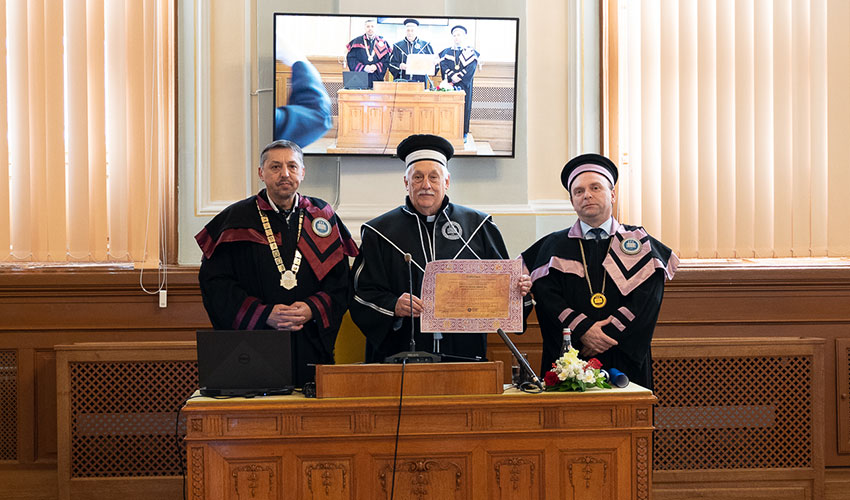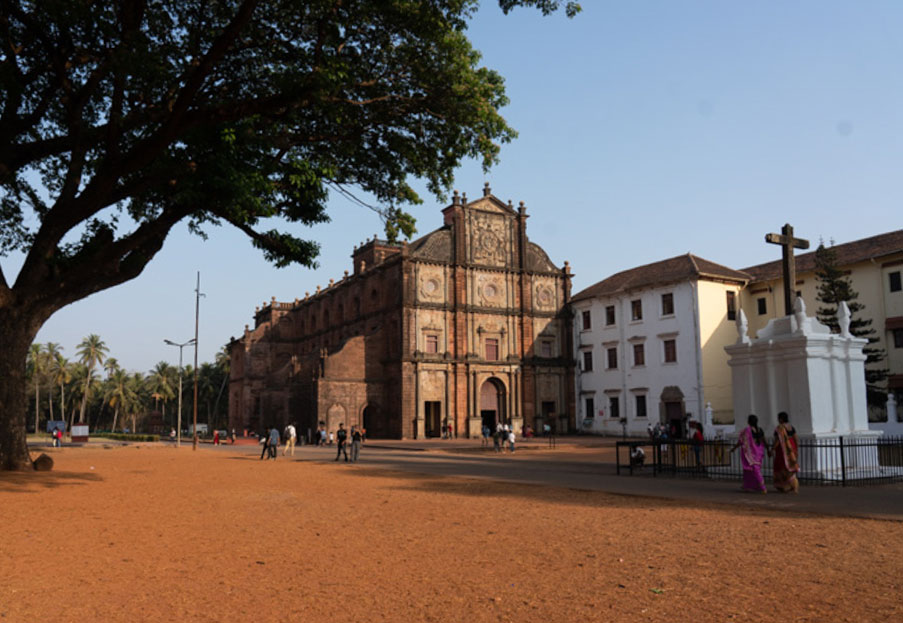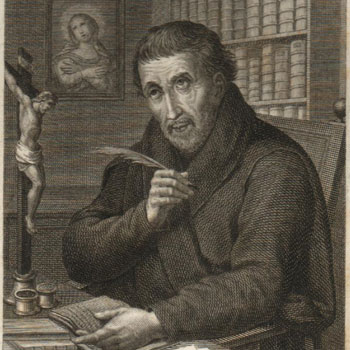In Cluj-Napoca, Romania, Father General receives a doctorate honoris causa
“The Senate of the Babeş-Bolyai University of Cluj-Napoca (BBU) awards the title of Doctor honoris causa to the Reverend Father Arturo Sosa Abascal, S.J., Superior General of the Society of Jesus, for his support of academic theological education, for his promotion of a culture of solidarity at the international level, and for the contribution of the Society of Jesus to the academic tradition of Cluj since the foundation of the Jesuit Academy - Academia Claudiopolitana - in 1581, a legacy kept alive today at Babeş-Bolyai University.”
On 17 November 2023, Father General received this distinction from a university with a very important Jesuit tradition in this part of Transylvania where a majority of the population is of Hungarian culture. Like other European universities (Prague, Vienna, Vilnius, etc.), the BBU has grown in several stages. However, its origins are clearly linked to the Society of Jesus, since Pope Gregory XIII entrusted the University of Cluj to the Jesuits in 1581. The Jesuits ran the university until the Society of Jesus was abolished in 1773. It was then placed under imperial, royal and republican authority respectively, depending on the political vicissitudes of the region.
The
Jesuit legacy is still very real. Today, the BBU, whose name honours three
Romanian scientists, offers the most comprehensive theological program in
Central Europe. Two departments, Roman Catholic Theology and Greek Catholic
Theology, jointly nominated Fr Arturo Sosa for an honorary doctorate.
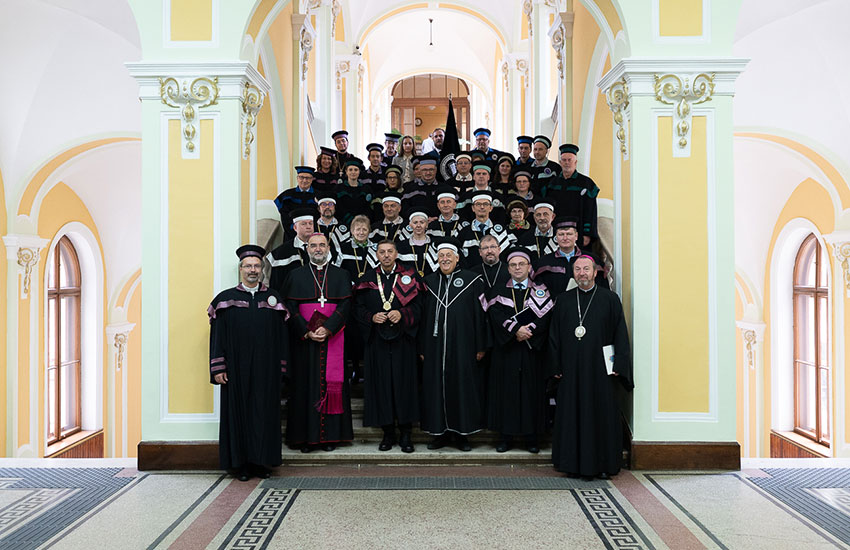
During the ceremony, the Directors and Deans of the two departments introduced Father Sosa to the members of their university. They highlighted in particular his commitment to higher education. From the Department of Roman Catholic Theology, Professor Oláh Zoltán and Dean Diósi Dávid strongly emphasized the recipient’s social commitment. “Since his youth, [Arturo Sosa] has been concerned with improving the lives of the Venezuelan people and, after completing his studies in philosophy and theology, he obtained a Ph.D. in political science from the Central University of Venezuela. The motivation for this great interest in politics was expressed in an interview just after his appointment as Superior General of the Society of Jesus: ‘One of the things that seems most important to me today is to strengthen the sense of global citizenship.’ (...) From 1976 to 1996, Arturo Sosa was editor and then editor-in-chief of the magazine SIC (Caracas), a journal focusing on social and political ethics which won the national journalism prize under his direction in 1979. His work in this capacity bears witness to his sensitivity to the vulnerable sectors of society and his keen interest in the problems facing the Venezuelan people.”
The
Director and the Dean of the Department of Greek Catholic Theology, Professors
Marius Grigore Furtună and Cristian Barta, emphasised the extent to which the
Superior General’s career had promoted education at all levels, including
through the Fe y Alegría network, of Venezuelan origin, which supports
the social advancement of the most vulnerable. They thanked the Society of
Jesus for having enabled many members of the BBU community to benefit from
scholarships at Jesuit universities, in particular the Pontifical Gregorian
University and the Pontifical Oriental Institute. They concluded by saying: “The
award of the title of Doctor honoris causa to the Superior General of
the Society of Jesus underlines, at the level of the BBU, the consecration of
the academic tradition and the appreciation of the contribution of Jesuit
education in Transylvania. Finally, we are convinced that this gesture can open
up new collaborations with the vast academic network of the Society of Jesus.”
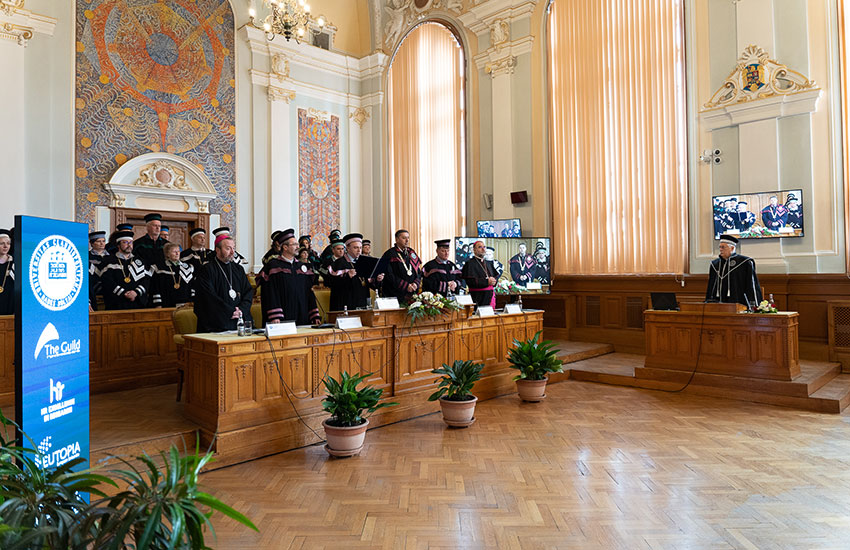
After this, Father General himself gave an address. Here is an extract from his remarks. He chose to talk on the theme of synodality of the Church and, more specifically, from his own lived experience as a Latin American Christian and Jesuit religious.
“The relevance of this theme for the life and mission of the Church today is unquestionable. For Pope Francis, synodality is ‘the path that God expects from the Church of the third millennium’. From the Latin American experience inspired by the ecclesiology of the Second Vatican Council, it is impossible not to agree with this assessment. God wants the Church to be synodal: that all Christians walk together as sons and brothers. If the Church is not like this, it is not the Church of Jesus of Nazareth, even if it is a very efficient institution with great social relevance.
However, the Church’s difficulty in being synodal comes hand in hand with the need to be synodal. There is no synodality in the established order. For the established order, there are only individuals who relate to those they want and for what they want, and social bodies that seek their own profit, such as globalized corporations. Relationships are secondary, seeking one’s own advantage primary.
From
the Latin American ecclesial perspective, on the other hand, what subsists are
not individuals but relationships, when they are free, horizontal and open to self-giving.
This is because, contrary to the current imagination of most Christians, our
God is not the absolute Monarch: according to St Thomas, ‘relationship in God
is not like an accident attached to a subject; it is the divine essence itself,
which is why it is subsistent’. It is not that the Father, Son and Spirit exist
and are related; if that were so, there would be three gods. What exists is the
relationship that both differentiates (Father, Son and Spirit) and holds
together (one true God). In the same way in the Church, filial and fraternal
relationships must have primacy and not doctrines, precepts and rites, or the
institution and its personages. This is what God expects from the Church for
this third millennium; this is what God hopes for the Church but it is not what
predominates in the Church today. It is not that these relationships are completely
lacking, but they are not yet the ones that set the tone.”
